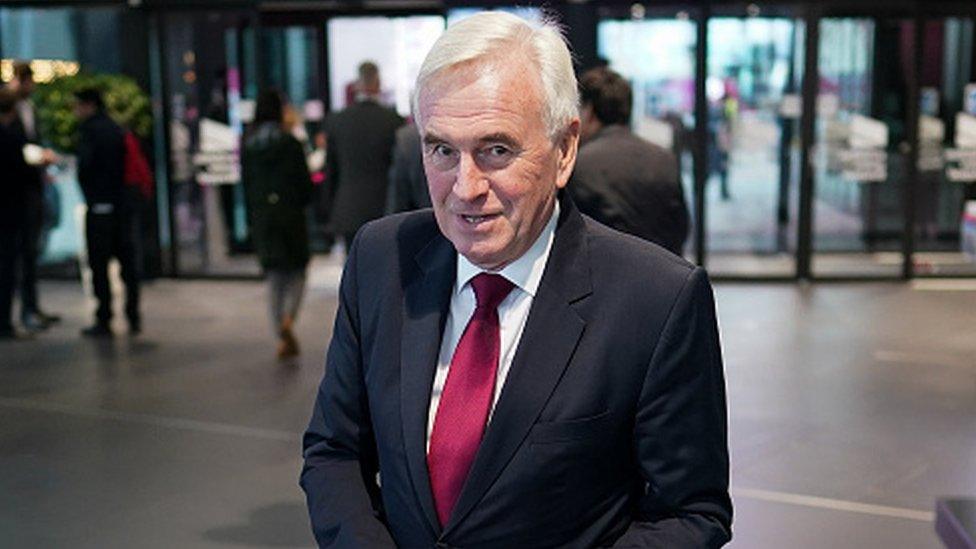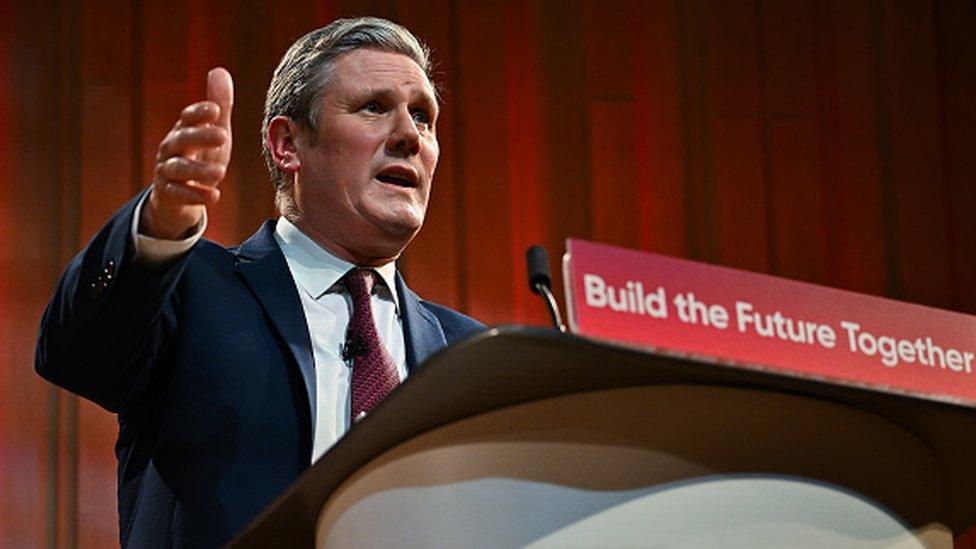Starmer accused of acting like monarch in vote row
- Published

John McDonnell was one of the architects of Labour's manifesto under its previous leader Jeremy Corbyn
Labour's former shadow chancellor has suggested leader Sir Keir Starmer was acting like a monarch in a rift over the party's policy on electoral reform.
John McDonnell is backing a proposed change to Labour's position on the UK's voting system.
At Labour's conference, he said policy decisions were taken democratically and "no-one is above that".
But Sir Keir has said electoral reform was not a priority under his leadership.
The Labour leader is facing increasing pressure to drop the party's historical support for the first-past-the-post voting system used for general elections in the UK.
MPs from all wings of the party have been urging him to instead embrace some level of proportional representation.
Proportional representation, or PR, is the idea that the seats in Parliament should reflect the number of votes cast.
Democracies around the world use various polling methods that ensure that voters feel their vote counts - in some cases it is simply that they indicate a second-choice candidate that they can show their backing for once their preferred choice is out of the running. This is not strictly proportional representation but is often put forward by supporters of PR as a fairer method of representing voters' wishes.
The Labour for a New Democracy campaign wants the leadership to back the introduction of PR its next election manifesto.
Labour members are set to debate support for this at Labour's conference in Liverpool, where the proposal will be voted on this week.
But Labour sources have suggested that PR will not be put in the manifesto, even if members vote for it at conference.
In an interview with the Observer newspaper, external this week, Sir Keir suggested he would not put a pledge for electoral reform in Labour's manifesto.
Appearing at a pro-PR rally organised by Labour for a New Democracy, Mr McDonnell said he had seen Sir Keir's comments.
"I think we just have to remind, as gently as we can, that all our decisions are taken democratically," Mr McDonnell said.
"I think Keir's been mixing with the royalty too much for the last few days. He's not a feudal monarchy.
"He's an elected leader of the party, accountable to the party and accountable to all of us.
"We have a democratic structure by which we determine those decisions. I hope that we'll be able to reflect that in a constructive dialogue."
He said he was confident PR would be in the party's manifesto by the next annual conference.
Mr McDonnell was one of the architects of Labour's 2017 and 2019 election manifestos under the previous leader, left-wing MP Jeremy Corbyn.
The former shadow chancellor told BBC Radio 4's Today programme that the 2019 election, which resulted in an 80-seat majority for the Conservative Party, showed that the current first-past-the-post system was "unfair".
"I still think Labour will get an overall majority in the next election, but we've got to say to people we need a fair voting system because we need a government that actually does represent the people," he added.
The BBC has asked Labour for comment on Mr McDonnell's remarks.

Sir Keir has said electoral reform was not a priority for him
Other Labour MPs appeared at the event to show their support for the motion to include PR in the next manifesto.
Among them was Stephen Kinnock, who said PR had "such a force of logic and clear rationality in terms of why it is the right thing to do".
"There is a basic democratic argument which is that every vote should count equally," Mr Kinnock said.
The MP for Nottingham East, Nadia Whittome, said the campaign for PR "has united all tendencies of the Labour Party, different parts of the left, the right and the centre".
"This isn't about where we come from in the party, it's about building a more democratic society," she said.
At last year's conference, about 80% of constituency party delegates voted in favour of embracing PR.
The proposal was defeated after unions opposed the move.
Since then, three of the biggest five unions linked to Labour have changed their stance, putting pressure on the party's leadership to follow suit.